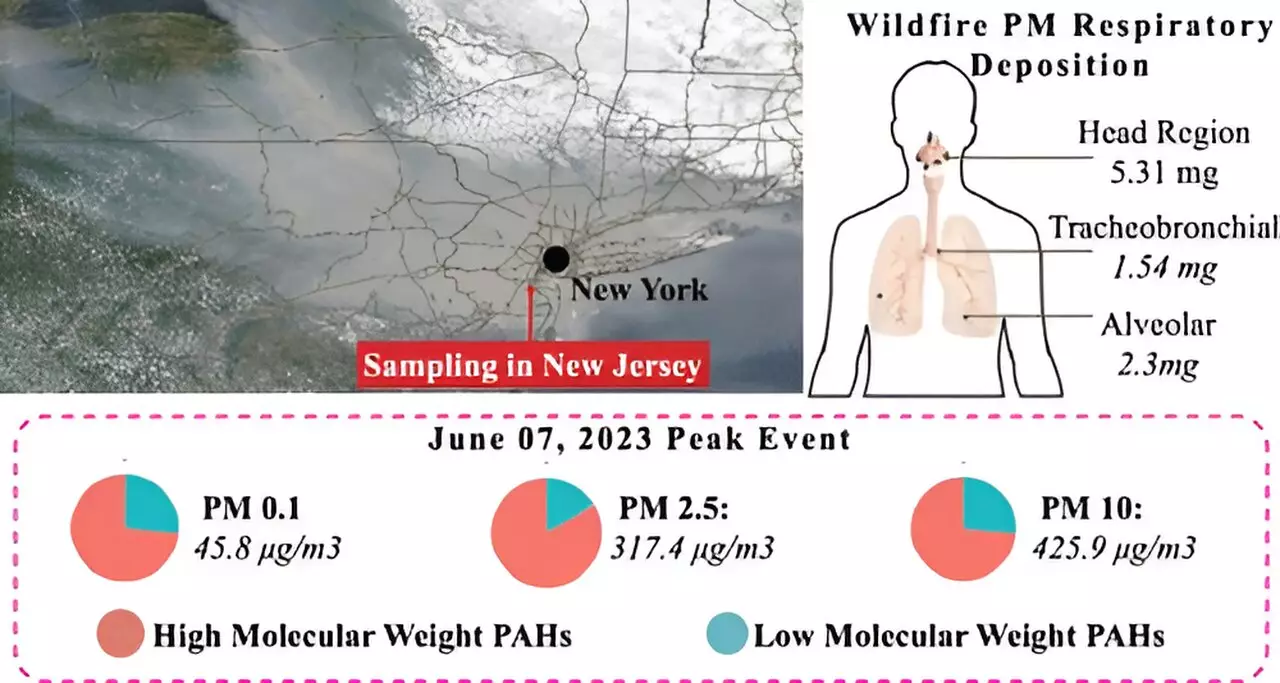As climate change escalates, the frequency and intensity of wildfires are becoming increasingly alarming. A study conducted by Rutgers University highlights the urgent public health risks associated with particulate matter from climate-driven wildfire events, particularly a significant fire that occurred in June 2023. The implications of this research are profound, as it underscores not only the immediate health risks posed by wildfires but also the long-term consequences for air quality and public health in densely populated areas like New Jersey and New York City.
The Rutgers study, published in the journal *Environmental Science & Technology*, presents an in-depth analysis of wildfire-related particulate matter. Lead author, Dr. Jose Guillermo “Memo” Cedeño Laurent, and his colleagues assessed both the physical and chemical characteristics of particles generated by wildfires. Their research marks a pivotal moment as it represents the first characterization of these particles from climate-driven wildfires within the Northeast—a region traditionally less affected by such environmental disasters.
During their investigation, the researchers identified alarmingly high concentrations of particulate matter that far exceeded national air quality standards. In fact, the levels reached during the peak of the June 2023 wildfire were unprecedented, marking an exceptional spike over 10 times higher than what has been observed in over five decades of air quality monitoring. This was particularly concerning due to the presence of polycyclic aromatic hydrocarbons (PAHs), toxic compounds associated with cancer, which were found in substantial quantities.
The implications of these findings are grim. Particulate matter, especially ultrafine particles, poses serious health risks as they can penetrate deep into the lungs, leading to acute respiratory and cardiovascular issues. Recent epidemiological studies have indicated a correlation between wildfire smoke exposure and spikes in emergency room visits related to respiratory and cardiovascular ailments in urban areas like New York City. The research highlights how such pollution may worsen existing health disparities faced by vulnerable communities already burdened by poor air quality.
Dr. Cedeño Laurent notes that the estimated inhalation dose of particulate matter during the wildfire event exceeded 9 micrograms lodged in the lungs over a 72-hour exposure period. This dose is significant enough to precipitate serious health crises among populations exposed to wildfire smoke, suggesting an urgent need for public health interventions.
The Rutgers researchers emphasize that without a deeper understanding of how wildfire smoke affects human health and the mechanisms behind these impacts, effective public health strategies cannot be developed. They have initiated an array of studies that explore the effects of particulate matter on various organs, including the lungs and the cardiovascular system. Collaborating institutions are assessing the implications for not only respiratory health but also heart and brain health, illustrating the multifaceted hazards posed by wildfire smoke.
This research is essential for elucidating the broader health impacts of wildfire smoke and establishing a scientific framework for public health responses. By drawing connections between air pollution from wildfires and specific health outcomes, the study creates a roadmap for future investigations and interventions.
The findings from the Rutgers research have significant implications for public health officials and policymakers. Dr. Philip Demokritou, a senior author on the study, articulated the importance of adapting strategy to address the realities of climate change and its impact on air quality. Effective risk assessments informed by data such as this study can empower communities to implement necessary health precautions and publicity information campaigns aimed at protecting vulnerable populations.
Moreover, utilizing data to create tailored health advisories could equip communities to better navigate ongoing climate events. With evidence mounting that wildfire pollution can exacerbate existing health disparities, ensuring improved air quality and health outcomes should become a priority for urban planners and public health officials alike.
As climate change continues to shape our environment and exacerbate natural disasters, understanding the health implications of wildfire smoke becomes increasingly vital. The Rutgers study provides crucial insights into the particulate matter generated by recent wildfires, revealing alarming health risks previously underestimated in densely populated areas. The urgent call to action from researchers like Cedeño Laurent and Demokritou highlights the need for interdisciplinary collaboration and innovative research avenues to address these challenges.
Moving forward, continued exploration of the physiological impacts of wildfire smoke will be essential for developing effective public health strategies to safeguard communities from these emerging environmental threats. The collaboration of academic institutions, healthcare providers, and policymakers presents a holistic approach to mitigating the effects of climate-driven events, reinforcing our collective resilience in the face of a changing planet.

